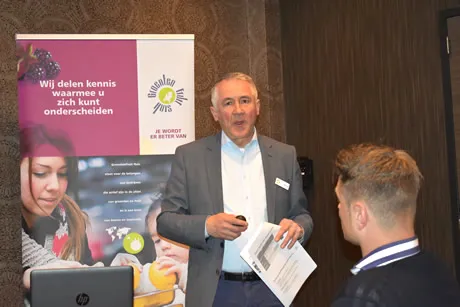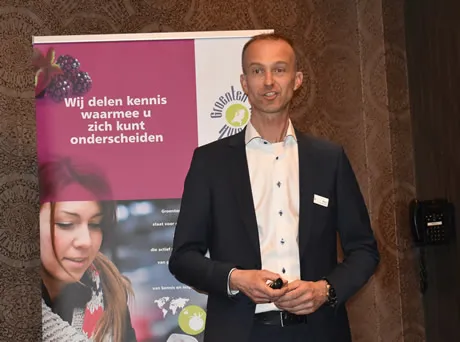During his introductory speech of the general meeting for fruit trading of GroentenFruit Huis, chairperson of the Comité Fruit, Peter van Osch of Veiling Zaltbommel, first explained the export to new markets that opened up in the past year, such as Brazil, China, India, Vietnam, Colombia and Mexico for pears, and Vietnam, India, Colombia and South Africa for apples. The apple export to India in particular, which had seemed so promising in 2017, dropped back to zero, which can be blamed on the market situation. Early in 2019, the export was started again.

Peter van Osch
The market access dossiers of apples in China are currently being worked on, a list of diseases and pests has already been established, and the plots have been signed up as well. Late 2019, a high level meeting will take place, following which a protocol can be signed late in 2019, in the most optimistic case. The market access for apples and pears in Thailand – this month a letter was sent regarding the monitoring of the product and the export inspection – and for pears in South Africa – where companies are currently deciding the market potential – is also still in its infancy.

Besides, the chairperson referred to the last meeting, when companies could bet fictional money on dossiers they thought the Comité should be dedicated to. The promotion of top fruit for far destinations and soft fruit for the domestic market was clearly desired back then. Peter has now concluded that placing fictional money isn’t the same as using actual money, because not enough money has been collected yet for any promotional campaigns.

Richard Schouten
Richard Schouten, manager of GroentenFruit Huis next explained the activities of the representative. For example, he mentioned the closed horticultural agreement and the lobbying in advance of the imminent Brexit deadline. “Everything’s still up in the air regarding Brexit. Fortunately, we from the fresh produce sector are used to exporting to third countries, and we know what it’s like to work with phytosanitary requirements. However, that doesn’t mean we’re not expecting chaos on the borders. We do expect we have a good solution to this problem, with a so-called green lane and a repositioned border check for Dutch and European product.”

Wilko van den Berg
Wilco van den Berg, responsible for market analyses at GroentenFruit Huis and secretary of the Comité Fruit, explained the developments of fruit sales on the Dutch, German and Polish markets. In the Netherlands, apples, bananas and oranges are still the top three of fruit sold most often, although these purchases are under pressure. The volume of fruit that was sold in 2018, was four per cent lower, but prices were eight per cent higher than the year before. Soft fruit experienced an enormous growth. In five years, volume increased by nearly 30 per cent, and expenses even increased by 77 per cent. The expenses of raspberries were even 12 times higher in 2018 than in 2013.
Germany showed a similar trend, with fewer sold kilograms, but stable expenses. However, the decrease in apple sales is even more considerable in Germany. Of avocados, although priced lower in 2018, as much as 44 million kilograms were sold in 2018, mostly by young buyers, papayas are beloved by older generations. In Germany, Aldi sells the largest volume of fruit (19 per cent), followed by Lidl and Edeka (both 13 per cent). In terms of value, however, it was mostly Edeka and Rewe that showed increases.
For the first time ever, GroentenFruit Huis also bought data about the Polish market, where the purchased volume in 2018 was about two per cent higher than in 2013, but expenses were 20 per cent higher. In this major apple production country, considerably fewer apples were sold last year (-19 per cent). Challenges for the export to Poland for Dutch exporters are the considerably lower average prices of the fruit and the retail landscape, which besides featuring Biedronka, Lidl and Kaufland, is very fractured with a lot of small players, according to Wilco.
